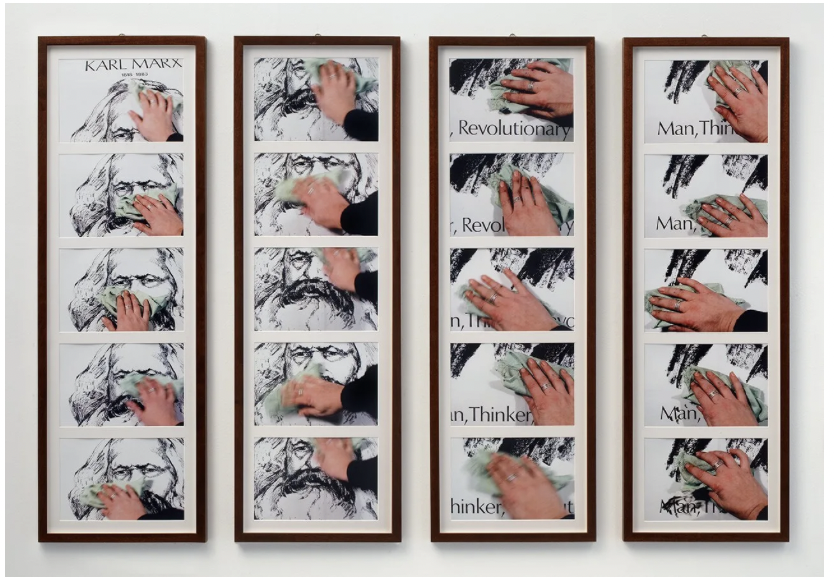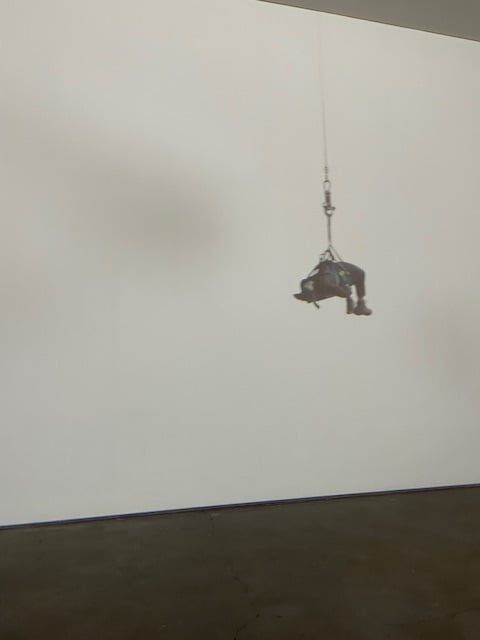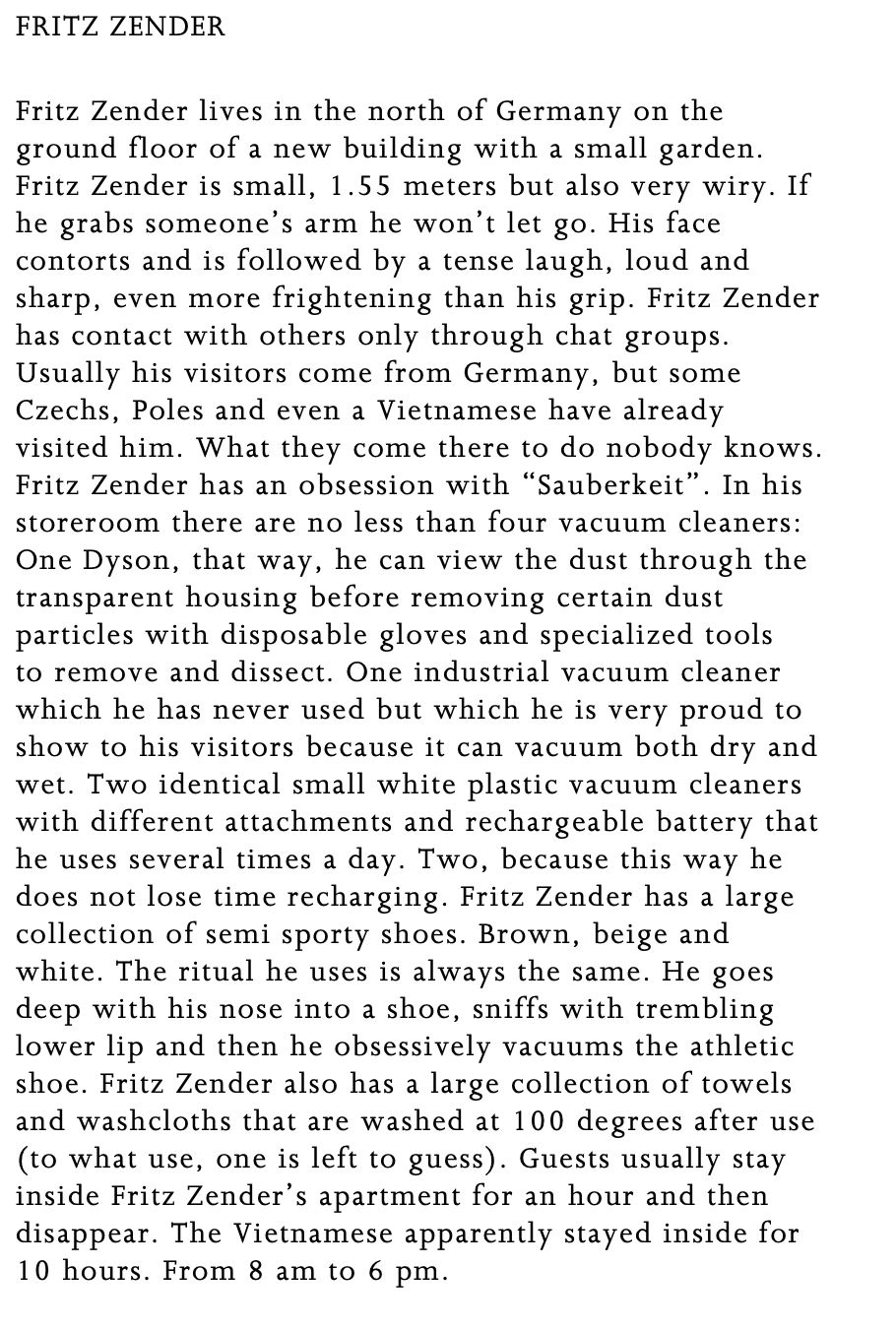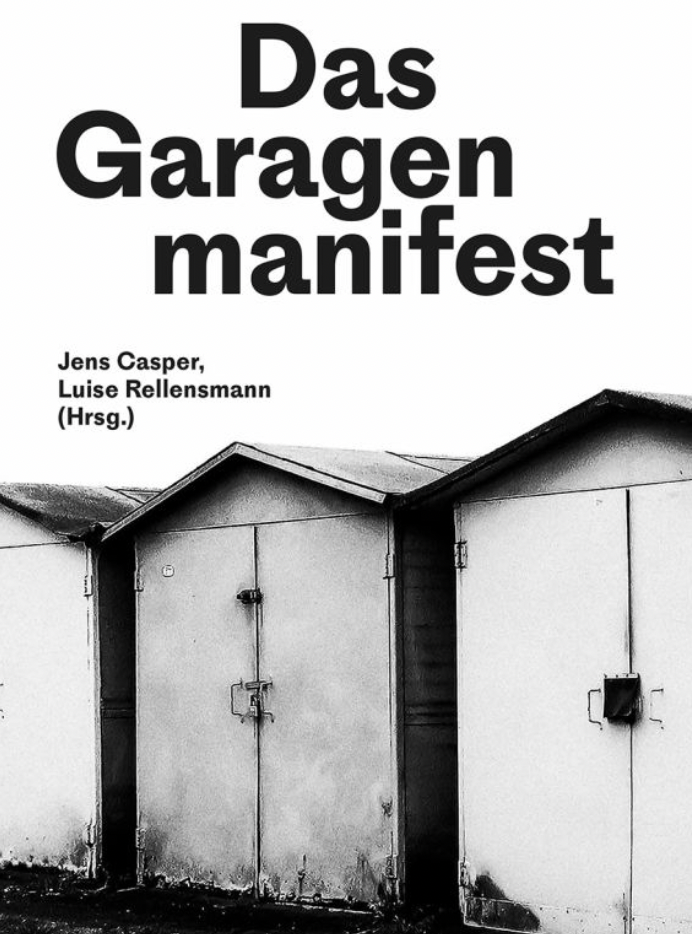Bodega Kat (Look at what the Kat dragged in, edition abroad Oct./Nov. '24)

The work is a comment on Marx’s refusal to acknowledge female domestic labour in the home.
Greetings, friends!
By now, this newsletter has devolved into a bi-annual drop—too infrequent to not come as surprise, yet too aggregated to be a welcome one.
I’ve also noticed another pattern: I’m most motivated—(or perhaps isolated enough)—to write whenever I’m in New York or the U.S. more broadly.
But now it’s definitely “U.S.” instead of “us” - again: We live in an age of complicity, where we are all connected yet too indifferent to inconvenience ourselves by connecting the dots (as I just read).
I enjoyed a heady mix of reward, wonder, and devastation abroad, as documented here, attempted synthesis and faltered, trying to make sense of 1- word notes on leaves falling from in-between pages, with the heating pipes singing their defunct songs in an old warehouse in Brooklyn. Between this newsletter and last, my P-Berg neighborhood also saw the summer of sinkholes and abducted cats. Posters and cavities loomed everywhere.
What we miss(ed) lingers—by design (as I of now spent half the year collecting links)—in the distant past or faraway places, too: Germany, France, and the expanse of the Internet. The imaginative nature of events makes the ongoing budget cuts for culture in Berlin feel even bleaker. I can understand how someone with a less vivid mind or limited openness to ambiguity and shock might see them as dispensable. It was still especially disheartening to find myself, by chance, seated next to our mayor’s aide (with eyes as cold as ice) on a train to Boston. His casual indifference—soaring in the clouds with startup bros, dreaming of imagined techno-futures and capitalism—stood in stark contrast to the protests erupting in Berlin that same day, focused on tangible, real-world issues. But those realities, it seems, hold less appeal, perhaps because they can’t be programmed into submission. Without complexity, all that remains is banal.

What we missed (categorised by cities/countries):
//Berlin:
In spring, DAS MINSK displayed the group show SOFT POWER. It understood textiles not only as crafted objects but also as a part of systems that negotiate power relations. This includes the webs of production and trade that continue to move textiles and people across the globe; the histories, cartographies, and cosmologies that unfold around them; and their use as an integral part of our daily routines. The exhibition was also accompanied by a film program.
- Same, but different: https://www.kunstverein-muenchen.de/de/programm/ausstellungen/rueckblick/2024/key-operators - the exhibition uses weaving and coding as metaphors to uncover overlooked contributions of women in the history of technology.Schlossaneignung: Artistic interventions on the façade of the fully Berlin Palace aimed to highlight new perspectives on German history and to highlight suppressed narratives. Royal McMansion, as national symbol must be reclaimed from right-wing appropriation and used to promote critical and pluralistic approaches to German history and identity.
See here for all selected artistic interventions: https://schlossaneignung.de/wp-content/uploads/DOM_Magazine_No_17_Auszug-.pdf . Should you ever enter - this is one of the few aspects of the Forum that I enjoyed: https://www.humboldtforum.org/en/programm/dauerangebot/exhibition/ansichtssachen-51638/Symposium: Small Forms in Circulation:
Research Clusters are my favourite aspirational things. I´d so love to come up with new ones for a living- and this one, regarding small textual and material forms, I´m especially fond of.
The cluster recently convened an conference, exploring how compressed forms—from early modern pamphlets to Instagram stories—shape and interact with diverse publics. It focused on the role of infrastructures in their circulation, the practices that enable their dissemination, and how they influence the formation and dynamics of public life.
so toll, so leer Teslocraty: Capitalism without Democracy?- examined the socio-ecological transformation and the tension between capitalism and democracy. Sparked by recent developments in Grünheide (next to Berlin)— resistance to Tesla factory expansion, a forest occupation, and attacks on infrastructure—it questioned whether this marks the "final stage of green capitalism" or a deeper erosion of parliamentary democracy. The discussion delves into the role of capital in the climate crisis, corporate power, union busting, and the broader implications of tech-driven economic development.(People who know me know I´m following the patterns closely that lead EM- and can also recommend this article, exploring the connection between ex-South Africans and American capitalism)
Red is the color of crisis, analysis and correction. Red May@LFB dedicated several nights way back in spring to new releases in the field of political non-fiction, not necessarily about current events, but the overarching processes scaffolding them: social dynamics, schools of thought and political economy- (german only, sorry)
Arctic Hyteria @ KINDL: From the late 1980s until the beginning of the 2000s, artist Pia Arke mapped the intricate relations between time, memory, space, identity, and myth in pictures of and from Greenland. Born to a Inuk mother and a Danish father, she wove biographical components of her own complex history into her work. Arctic Hysteria shed light on the narratives enclosing the colonial relations between Greenland and Denmark, as seen through Arkes works, and to open it up to a discussion of continuing colonial structures at large.
Wellenbad @ Stadtbad Neukölln was a unique musical experience for an audience floating in water. Composers Joseph Baader, Nathalie Brum, and Vincent Stange, performing as trio Wellenbad, presented live electroacoustic music using underwater speakers, creating a soundscape audible both above and below the waterline.

The tears of a clown. This excellent exhibition and experimental reading about CCTV at GROTTO-

Trailer here: https://vimeo.com/873729033
From Net, City, World to Cloud, Market, Sea: Without metaphors, we wouldn’t be able to talk about and with computers - On the basis of six terms, this project traces various narratives, experiences, and points of historicity of the Internet: It moves from the overarching metaphors of the Internet to concrete visual manifestations and attempts to historicize the Internet and its linguistic imaginaries (make sure to also check out the boardgame by Omsk Social Club)-
Domestic Optimism is the third part in artist Lyónn Wolf’s “Domestic Optimism” cycle, which turns a working-class gaze onto architecture, social housing and modernism. The Berlin edition includes a newly commissioned sound work that reestablishes and reimagines Dublin’s former Ballymun Towers as working class architectural heritage and queer high rise utopias.
//Cologne:
Nevin Aladag @ Max Ernst-Museum Brühl: Nevin Aladağ’s works explore themes of cultural identity, origins, and the interplay between sound, movement, and place.
In Session, the landscapes of the UAE serve as the stage for a sonic portrait, where instruments—brought by migrant workers from diverse countries—highlight the cultural blending of the region.
Traces reflects on the artist’s musical childhood, poetically questioning roots and origins through sound. In Jamming, Berlin’s layered history and architecture—from the Schinkel era to post-reunification—becomes a backdrop for a performative piece.
In Raise the Roof, stiletto-clad dancers imprint copper plates, turning the floor into a sculptural relief shaped by rhythm.//Paris:
- Approaching unreason @ Palais de Tokyo: This exhibition was really fascinating but text heavy. Institutional psychotherapy (a current research interest of mine) is an experimental psychiatric practice that was developed in the mid-20th century, centering on the conviction that mental disorders can't be isolated from their social and institutional contexts (and they will only grow under current conditions, so its important to educate oneself). Taking inspiration from the revolutionary practices that draw upon the collective and upon artistic creation, the exhibition explored different ways of transforming spaces of isolation into hubs of protection that can offer refuges from the violence of society.

wtf //US/NYC
In his lecture “Radio-Activities: Architecture and Broadcasting in Cold War Berlin” Alfredo Thiermann payed particular attention to Berlin’s buildings, walls, transmission towers, factories, research institutions, and territorial organizations during the Cold War period, which enabled the production, reproduction, and transmission of sonic-based content across the divide of the Iron Curtain:
Jenna Bliss @ amant Foundation & Haus am Waldsee: Jenna Bliss explores the political dimensions of how we see and narrate the world. Her work combines research, archival materials, and original footage to uncover hidden ideologies and overlooked connections in global events. For her first institutional exhibition in Germany, Bliss presented two projects from a series examining Wall Street’s history and the impact of high-risk financial speculation: f.i. Her film True Entertainment (2023) (that I LOVED) satirizes art world stereotypes and early 2000s nostalgia while following fictional artist Lola Van Haas at an art fair before the 2008 financial crisis: Beneath the glossy surface, the film reveals the tension of looming collapse, reflecting Bliss’s critique of cyclical systems like the art market.
//Elsewhere
Venice: Monte de Piéta @ Fonda Prada - Christoph Büchel’s installation (hosted at the historic Palazzo Ca’ Corner della Regina) explores debt as the foundation of human society and a tool of political and cultural power. Venice, with its rich history of commerce and art, provides the ideal backdrop for examining these complex themes within the context of contemporary society. He recreated a fictitious bankrupt pawnshop around his work The Diamond Maker , featuring lab-grown diamonds created from the destruction of entire body of artworks. The project blends historical and contemporary references, incorporating objects and documents that examine property, finance, collections, and the creation of wealth—real or artificial.
https://vimeo.com/968688563Croatia: To live together - The Island School of Social Autonomy:
What seems important today is to find you pod and up your partisan skills, too: The philosophical concept of praxis schools remain an important orientation rooted in the most positive elements that Marxism has to offer: In the 1960s, the Korčula summer school was an important meeting point for philosophers and social critics from all over the world, like Ernst Bloch, Herbert Marcuse, Henri Lefebvre, Jürgen Habermas or Daniel Guerin. Some of the topics discussed there were creativity and creation, the meaning of technological progress, and theology.
In the 1980s gatherings in Komiža followed, but with a significant detour in the direction of the concrete actions shaped in a specific time and space – the final years of Yugoslavia.
Today, Island School of Social Autonomy (ISSA) goes a step beyond, without forgetting the legacies from the past.
Summers spend debating > summers spent debacling
Things to do and see (everywhere):
Code Switch @ Schomburg Center (NYC), celebrating contributions by artists of African descent to the field of new media art and digital practice. It turns toward the uneasy relationship between the origins of the Internet as government-funded intelligence initiative, and the complex dilemmas arising between advancements of technologies that redefine modernity and visual culture: https://thekitchen.org/on-view/code-switch-distributing-blackness-reprogramming-internet-art/
and, another exhibition, or more specifically, artwork I enjoyed was: Shifting degrees of certainty, seen at https://thejewishmuseum.org/exhibitions/ilit-azoulay-mere-things. In 2013, Ilit Azoulay spent five months at KW Berlin exploring urban archaeology, traveling across Germany, photographing objects and architectural fragments in cities like Berlin, Weimar, and Regensburg and meticulously tracing the origins of these items - gathering information from diverse sources, including monasteries, lawyers, taxidermy experts, squatters and plant researchers. Her research extended to recording sounds associated with the objects, creating an audio guide that revealed the historical and personal narratives behind her findings.Geteilte Welten @ Tiergarten is an audiowalk & sonic intervention into Berlin Tiergarten’s memory landscapes and an artistic research project by Miriam Schickler. It reads the various Holocaust memorials as well as other public Tiergarten sites through one another for their various entanglements, linking histories of the Third Reich with colonial and migration histories. By being attentive to what gets excluded as well as what comes to matter, Geteilte Welten strives to become more attuned to how differences are created in the world, and what particular effects they have on subjects, their lives and bodies today.
Take this, Elon: “Bürokratie”(@ Roter Salon)- This event, part of the series "Gefühle am Ende der Welt" (fostering philosophical discussions on society's collective feelings and observations amidst growing crises, emphasising the need to confront the collapse of societal systems), examines the impact of bureaucracy on individuals and democracy. It is presented as both a promise and a threat: to maintain fairness and order through the "utopia of rules" (D. Graeber), same as a source of frustration and alienation, as "rule of nobody." (Arendt)
Instituting Care @ ICI (Dec. 11th) (and strongly related to the exhibition in Paris in the review) examines the relationship between social and mental alienation, exploring “care and cure”- practices that resist institutional homogenization and transcend neoliberal notions of individual well-being by introducing institutional psychotherapy. Spearheaded by Marxist psychiatrists, activists, philosophers, nuns, Jewish refugees, and surrealist artists, the mid-century movement pioneered group therapies and patient-run cooperatives. Their materialist and “disalienationist” methods influenced Frantz Fanon’s decolonial psychiatry and Félix Guattari’s schizoanalysis, reshaping psychoanalysis, education, and social work.

Dora Garcia creates diagrams based on the annotations she left in the margins of books by f.i. psychoanalyst Jacques Lacan or science-fiction author Philip K. Dick. Buttoned-up, yet butt-naked: Michel Foucault. This event @ Helle Panke (Dec. 5th) commemorates the (controversial) life and work of French philosopher and activist Michel Foucault, pioneer of queer theory, who passed away in 1984 as one of Europe’s first prominent AIDS victims. The discussion explores Foucault’s influence on contemporary political, philosophical, and psychological debates, his engagement with Marxist thought through Louis Althusser, and the impact of his partnership with Daniel Defert on his human rights advocacy.

Another brick in the wall. The Death of a star @ Isabella Bortolozzi Gallery
“Do you think I became who I am solely by my good looks and enigmatic charm? No. It was an insatiable desire to win by any means. (…) If you want something you look it in the eye and grab it by the throat. If you see something in someone you utilize it. Would you look destiny in the eye and blink twice?”
- (apropos Hollywood, or Halloween, also check out the documentation and especially short stories creating the backdrop of Pasta Fatal, a prior exhibition by artist duo de Gruyter & Thys - the mannequins and puppets created throughout their career, while wildly different in subject and treatment, are characterized by an arresting appearance and a rotten core.

Nan @ Neue Nationalgalerie: Neue Nationalgalerie's retrospective is the first comprehensive exhibition of Goldin's work in Germany, showcasing 6 explorations of personal and collective narratives through her slideshows, which she describes as “films made up of stills” and her intimate, unflinching view of human experience: The Ballad of Sexual Dependency (1981–2022), magnum opus documenting intimacy and relationships, The Other Side (1992–2021): A tribute to her trans friends, photographed over decades, Sisters, Saints and Sibyls (2004–2022): A poignant exploration of family trauma and suicide, Fire Leap (2010–2022): A look into the world of children, Memory Lost (2019–2021): A haunting depiction of drug withdrawal, Sirens (2019–2020): A visual journey into drug-induced ecstasy.

NG …in 2025: My friend Cosima will be part of https://chemnitz2025.de/en/3000garagen/ with her site-specific installation Fischelant: The #3000Garagen project explores the cultural and social significance of garages in Eastern Europe, with a focus on Chemnitz, (where an estimated 30,000 garages remain a prominent feature of the urban landscape). Originally built collectively during the socialist era, garages have become spaces for individual treats nowadays: car storage, hobbies, and of course “innovation”, serving as hubs for start-ups. (This is something I really look forward to).

Things from the Web:
The (Insta-)Colloquium for Unpopular Culture (est. 2007): part archaeology, part astronomy
Two of my favourite creatives collide in this audio essay: Writer Olivia Laing presents a imaginative portrait of Arthur Russell- cellist, composer, songwriter, and disco innovator & key figure in the New York downtown scene of the 1970s. Despite being prolific, his struggle to complete projects- meaning that much of his music remained unreleased during his lifetime, before he died of AIDS - his obituary read: “Arthur’s songs were so personal that it seems as though he simply vanished into his music.”
Looking for Freedom, BPB: This six-part podcast delves into the rise of libertarian authoritarianism, a growing ideological trend in Germany and beyond. Recent studies, like the 2023 Mitte-Studie, reveal that nearly 20% of Germans now hold radical market-libertarian views, rejecting any restrictions on individual behavior and prioritizing negative freedom—freedom from societal constraints.The podcast explores the origins and evolution of this radicalized concept of freedom, examining its manifestations in microstates at sea, far-right bunker communities, and financial influencers in Dubai. It also investigates the dangers this ideology poses to democracy, as it fundamentally challenges social welfare and collective solidarity.
This is such a brilliant newsletter, and language simply is so beautiful, hysterical and elegant if you know how: https://buttondown.email/perfectsentences
TV Series of 2024 I liked (mostly German, sorry):
-30 Tage Lust: Freddy and Zeno have been a couple for nearly half their lives, while their friends navigated breakups and dating apps. But over time, they begin to wonder: are they missing out? Hesitant and clumsy, they venture into unfamiliar territory, facing awkward moments, dating mishaps, and the chaos of exploring lust and sexuality without each other. As their encounters pile up, the fragility of their bond becomes clear.
-Schwarze Früchte: This one is fun and tragic, at the same time: Lalo in his mid-20s, finds his life in turmoil after the sudden death of his father. Attempting to cope through impulsive actions, he makes rapid decisions that further destabilize his world.
-So long Marianne: So Long, Marianne tells the legendary and in mho dark love story between Canadian singer and poet Leonard Cohen and Norwegian Marianne Ihlen - but more so, also of their rag tag bands of artist friends.(When I was vacationing on Hydra in 2023 (?) of course I also acquired this book, to understand more about the destructive couple dynamics in the greek dive bars:https://westerlymag.com.au/a-time-and-place-the-story-of-hydras-expatriate-writers-dreamers-and-drifters/ )
Books from Boxes - My favourite reads this summer:Das Verschwinden des Philip S.- In 1975, left-wing terrorist Philip Werner Sauber was killed in a shootout with the police on a parking lot in Cologne. His then-girlfriend, author Ulrike Edschmid, took 40 years to transform her grief into delicate, introspective literature that as a side-product of the personal rift also described the early days of Berlins DFFB.

PS If the connections of this world were ever to unravel, Dorothee Elmiger's Aus der Zuckerfabrik would be a book to understand what once transpired: weaving together disparate scenes: a laborer wearing a T-shirt that reads "My skills never end" as he collects his wages, Switzerland’s first lottery millionaire gazing out at the Caribbean Sea, and goats crowding the author’s bed at night.She traces the paths of money and desire across centuries and continents, crafting biographies of mystics, the insatiable, gamblers, orgiasts, and colonialists.

Zuckerfabrik Enough, already.
K.